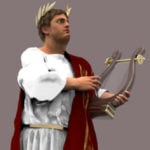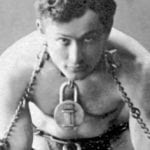 History
History  History
History  Health
Health 10 Everyday Activities That Secretly Alter Consciousness
 History
History Top 10 Historical Disasters Caused by Someone Calling in Sick
 Animals
Animals 10 New Shark Secrets That Recently Dropped
 Movies and TV
Movies and TV 10 Forgotten Realities of Early Live Television Broadcasts
 Technology
Technology 10 Stopgap Technologies That Became Industry Standards
 Weird Stuff
Weird Stuff 10 Wild Facts About Taxidermy That You Probably Didn’t Know
 Travel
Travel 10 Beautiful Travel Destinations (That Will Kill You)
 Miscellaneous
Miscellaneous 10 Modern Marriage Rituals Born from Corporate Branding
 Weird Stuff
Weird Stuff Ten Bizarre Visions of 2026 from Fiction
 History
History 10 “Modern” Problems with Surprising Historical Analogs
 Health
Health 10 Everyday Activities That Secretly Alter Consciousness
 History
History Top 10 Historical Disasters Caused by Someone Calling in Sick
Who's Behind Listverse?

Jamie Frater
Head Editor
Jamie founded Listverse due to an insatiable desire to share fascinating, obscure, and bizarre facts. He has been a guest speaker on numerous national radio and television stations and is a five time published author.
More About Us Animals
Animals 10 New Shark Secrets That Recently Dropped
 Movies and TV
Movies and TV 10 Forgotten Realities of Early Live Television Broadcasts
 Technology
Technology 10 Stopgap Technologies That Became Industry Standards
 Weird Stuff
Weird Stuff 10 Wild Facts About Taxidermy That You Probably Didn’t Know
 Travel
Travel 10 Beautiful Travel Destinations (That Will Kill You)
 Miscellaneous
Miscellaneous 10 Modern Marriage Rituals Born from Corporate Branding
 Weird Stuff
Weird Stuff Ten Bizarre Visions of 2026 from Fiction
10 Ridiculous Gentleman’s Duels Fought Over Nothing
Dueling was supposed to be the last resort when it came to settling matters of honor. Gentlemen were supposed to try to resolve their differences peacefully, but sometimes it seemed that a gentleman and his second must do what a gentleman and his second must do. In the 17th and 18th centuries, a code of honor held that any man who did not abide by the very strict rules would have to pay the penalty—namely that “his adversary will be justified in refusing to recognize him as a gentleman.”[1] A fate worse than death.
The rules were quite detailed and included advice on where a duel should be fought, when, what clothes the combatants should wear (ruffles, for example, being deemed unfair as they may prove a distraction), and so on. Surgical assistance should be on hand wherever possible, and seconds should ensure that no injured gentleman is left on the field. Most importantly of all, combatants should salute each other before commencing try to kill each other. In practice, many of these duels went off without any injury to either party, but unfortunately, neither party could know, until it was over, whether their opponent intended them permanent harm.
10 Alexander Hamilton And Aaron Burr
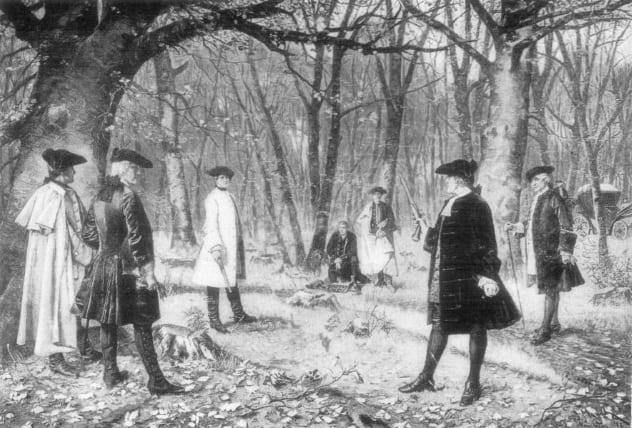
Aaron Burr and Alexander Hamilton, two of the Founding Fathers of the United States, had a lot in common. They both fought in the American Revolution and were both successful in politics at an early age. Burr rose to become vice president, while Hamilton became the first secretary of the treasury. However, it is said that the two men despised each other. The feud began when Burr defeated Hamilton’s father-in-law in a senate race, was inflamed when Hamilton’s popularity eclipsed Burr’s because of his flamboyance, and boiled over when Hamilton allegedly expressed a “despicable opinion” of Burr at a dinner party.[2]
In 1804, after Hamilton had refused to apologize, Burr demanded satisfaction, and the two arranged a duel. The precise nature of the events are unclear, but it is believed by some that Hamilton, as was customary for a gentleman, deliberately missed. Burr, on the other hand, whether by accident or design, shot Hamilton in the stomach, tearing through his internal organs and paralyzing him. Hamilton died 36 hours later.
Facing potential murder charges, Burr fled, and though he returned to Washington to serve out the rest of his term as vice president when the charges were dropped, his career never recovered.
9 Lady Almeria Braddock And Mrs. Elphinstone
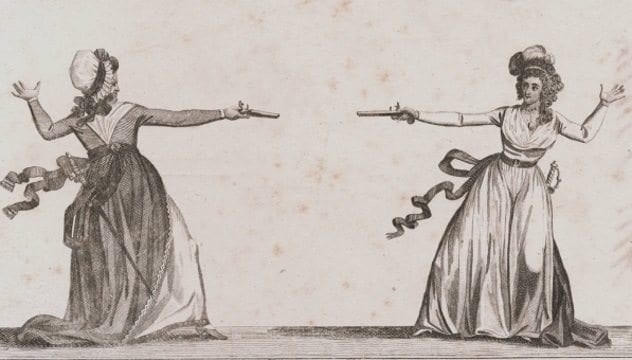
Dueling was not confined to gentlemen. Sometimes, gentlewomen got in on the action, too. In 1792, it was reported in Carlton House Magazine that Lady Almeria Braddock and Mrs. Elphinstone were taking tea when insults were said to have been exchanged. Mrs. Elphinstone had the temerity to tell Lady Braddock that she “had been” a beautiful woman.
Lady Braddock took exception to the past tense and took greater exception when the indiscreet Mrs. Elphinstone questioned the lady’s stated age, saying she was nearer to 60 than 30. Lady Almeria demanded satisfaction, to which Mrs Elphinstone is said to have replied, “Name your weapons. Swords or pistols?”
Lady Almeria responded, “Both!”[3]
On the morning of the duel, Mrs. Elphinstone put the first shot through Lady Almeria’s hat, which incensed the lady further. They set upon each other with swords, and Mrs. Elphinstone took a blow to her arm before the ladies judged honor to have been satisfied and ceased hostilities.
8 Alexander Pushkin And Georges D’Anthes
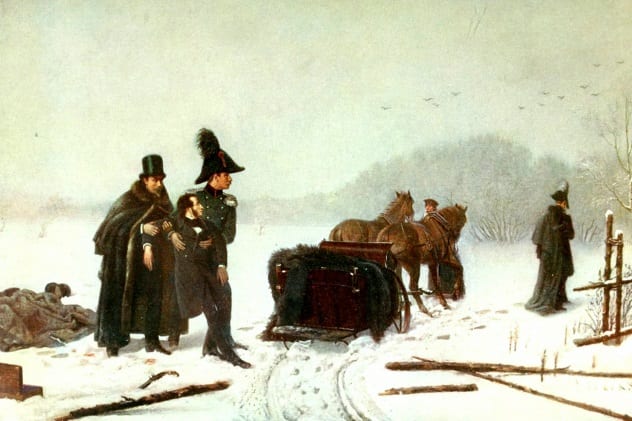
In 1834, the famous Russian poet Alexander Pushkin received a letter informing him that he had been elected to “The Most Serene Order of Cuckolds.” This was a fancy way of saying, “Your wife is cheating on you.” Georges d’Anthes was the dashing Frenchman who was supposed to have done the deed. Though d’Anthes and Natalya Pushkin had met and flirted over a series of dinners, it was never proven that she had been unfaithful.
However, it was not the first time Pushkin had received such letters. There had been previous allegations of an affair with Tsar Nicholas, which Pushkin, who had fought in a number of duels, was forced to tolerate, being unable to challenge a tsar to a duel. But a mere captain was a different matter. The taunts about being a cuckold weighed upon Pushkin’s mind, and he challenged d’Anthes. The duel was seemingly prevented when d’Anthes married someone else, but rumors persisted, and in January 1837, the two men finally faced each other with pistols.[3]
Pushkin was mortally wounded in the duel and died two days later. Georges d’Anthes was stripped of his rank and ordered to leave Russia permanently.
7 Ben Jonson And Gabriel Spenser
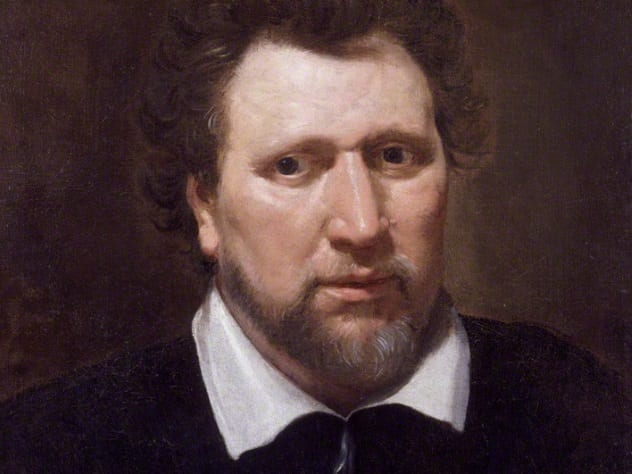
The playwright Ben Jonson (pictured above) was an accomplished man. He had at one time been a laborer but had worked his way up to become an actor and playwright. He was learned man, in fact, which was just as well.
One of his plays landed him and his leading man, Gabriel Spenser, in jail because of its political satire. It was the beginning of a bitter feud between the two men. Jonson’s career was on the rise, but Spenser’s hit the skids, and he began to drink.
Spenser had a history of violence, once stabbing a man through the eye with a sword and killing him, so Jonson was wise to be wary of him. In September 1598, the two men met by chance, and Spenser challenged Jonson to a duel. Spenser was at an advantage, since his sword was 25 centimeters (10 in) longer than Jonson’s. However, being an actor, Spenser spent some time swishing his sword theatrically, and Jonson, taking no chances, swiped at him viciously, leaving Spenser dead at his feet.[4]
Jonson was arrested and charged with murder but was saved from the scaffold by a legal loophole which stated that any man who understood Latin must, therefore, be a cleric and consequently immune to prosecution under secular law. This “benefit of clergy” excuse required only that Jonson be able to recite a psalm in Latin, which he duly did. He was released from Newgate Prison with an X branded on his thumb, to prevent him from using the excuse a second time.
6 Andrew Jackson And Charles Dickinson
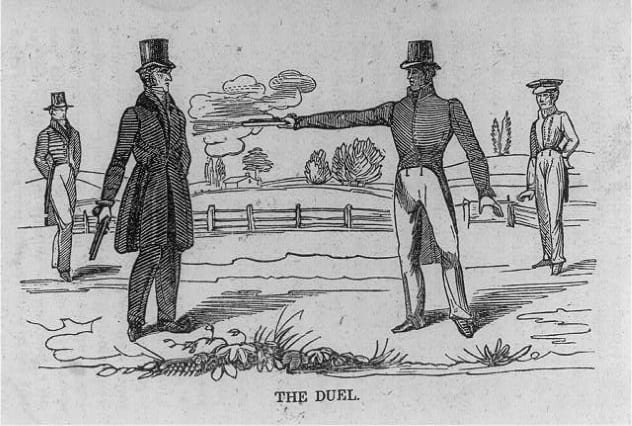
In 1806, Andrew Jackson quarreled with the attorney Charles Dickinson. The dispute had originated over a bet between Jackson and Dickinson’s father-in-law and ended with Dickinson insulting Jackson’s wife and then calling Jackson a “poltroon and a coward” in a statement published in the Nashville Review.
Obviously, no gentleman could be expected to tolerate such an insult, and Jackson challenged Dickinson to a duel. Dickinson was, unfortunately for Jackson, a regular duelist and one of the best shots in Tennessee, and being the one who was challenged, he had the choice of weapons. He chose pistols.
Dickinson fired the first shot, which broke two of Jackson’s ribs, the bullet lodging 5 centimeters (2 in) from his heart. (Dickinson’s seconds claimed that Jackson did not shoot at the same time because his gun misfired.) As Jackson clutched his chest, he recocked his gun and shot Dickinson dead. Though on the face of it, Jackson had good grounds to shoot, the rules of dueling were that each man should fire at the same time, but that if one man fired first, the other man should fire in the air and not take his time taking deliberate aim at his opponent.[5]
Though there was some unpleasantness over the issue, Jackson was never charged with murder. He was troubled with pain from the injury for the rest of his life, but it did his career no harm, as he went on to become the seventh president of the United States.
5 The Duke Of Wellington And The Earl Of Winchilsea
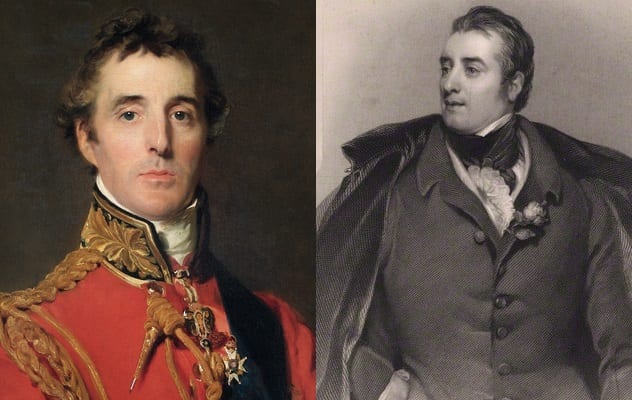
The Duke of Wellington (left above) was serving as prime minister when he fought a duel in 1829 with the Earl of Winchilsea (right above) over the Catholic Relief Bill, which allowed members of the Catholic Church to stand as MPs. The Earl, a staunch Protestant, accused Wellington of “an insidious design for the infringement of our liberties and the introduction of Popery into every department of the State.”
In today’s terms, that sounds rather mild. But Wellington felt that there had been a slight upon his honor and challenged Winchilsea to a duel.[6]
This all sounds rather thrilling. However, what transpired was that after much cloak-and-dagger work from the duelers’ seconds and a fair amount of tramping through the fields to find a secluded spot, both men aimed wide and deliberately missed. Winchilsea apologized, and they all went home.
All that drama for nothing.
4 Francois Fournier And Pierre Dupont
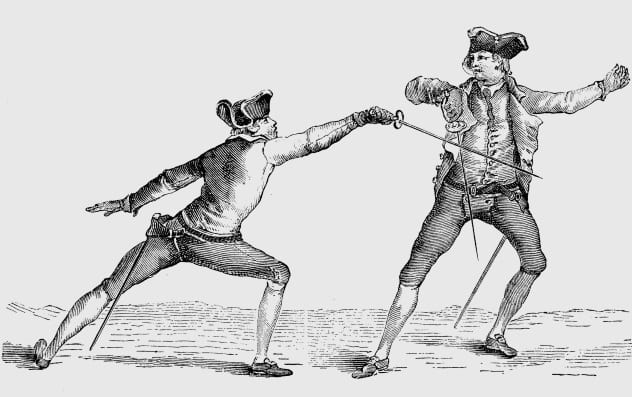
In 1794, when Pierre Dupont was given the task of delivering an unwelcome message to Francois Fournier, he could not have known that it would be the beginning of a 19-year duel. Fournier was known for his heated temper and was a keen duelist, despite the fact that Napoleon, in whose army both men served, had banned the practice.
Fournier took exception to the message and, in time-honored tradition, decided to shoot the messenger (although, actually, he used a sword). In their first meeting, Fournier was wounded and demanded further satisfaction. They met again, and Dupont was wounded. He demanded a rematch. They met yet again, and both men managed to wound the other, so no winner could be discerned.
So, the men drew up a contract, which set out the terms of their own private feud: Every time they came within 160 kilometers (100 mi) of each other, they would duel. The two met and fought a further 27 times, using swords, pistols, sabers, rapiers, and even lances. They fought on foot and on horseback.
Finally, in 1813, Dupont stabbed Fournier through the neck during a sword fight. Dupont then informed Fournier that, as he was about to be married, he would quite like to stop fighting now, thank you very much. The two men agreed on a final pistol showdown.
Dupont tricked Fournier into firing wide before advancing on him with a loaded pistol. Fournier, possibly out of consideration for the forthcoming nuptials, finally conceded, and the long duel was over.[7]
3 Lucius Marshall Walker And John Sapington Marmaduke
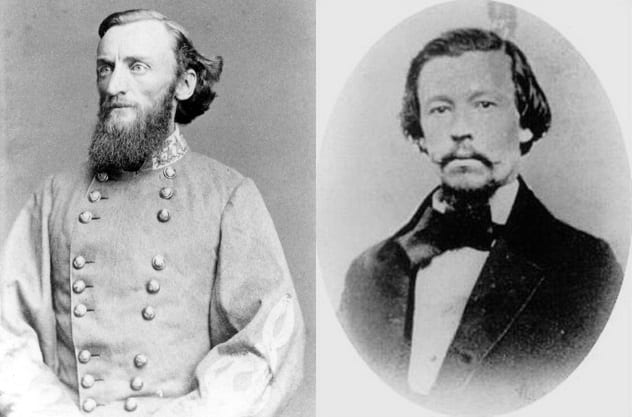
John Sapington Marmaduke (left above) and Lucius Marshall Walker (right above) were both brigadier generals in the Confederate Army. Both had graduated from West Point, and both were sent to Arkansas during the Civil War. In 1863, the two men fell out in a dispute over whether Walker had unnecessarily exposed Marmaduke’s troops to enemy fire. Marmaduke allegedly questioned Walker’s courage, and the two men began to exchange letters on the matter.
The letter carriers also fell out while exchanging communications, and Walker’s man took it upon himself to challenge Marmaduke on Walker’s behalf. Marmaduke’s postman took it upon himself to accept. The two messengers decided the terms of the duel, and their superior officers, it seems, just went along with it.
So, in September 1863, the two generals met near Little Rock to duel. The messengers served as their seconds. The generals each fired from 15 paces and missed. On their second shots, Marmaduke fatally wounded Walker, perhaps accidentally, since he rushed immediately to his side to ask if he was hurt and lent Walker his personal ambulance. Despite this, General Walker died the following day.[8]
The moral seems to be that if you want something done, it’s probably safer to do it yourself.
2 Baron Mohun And The Duke Of Hamilton
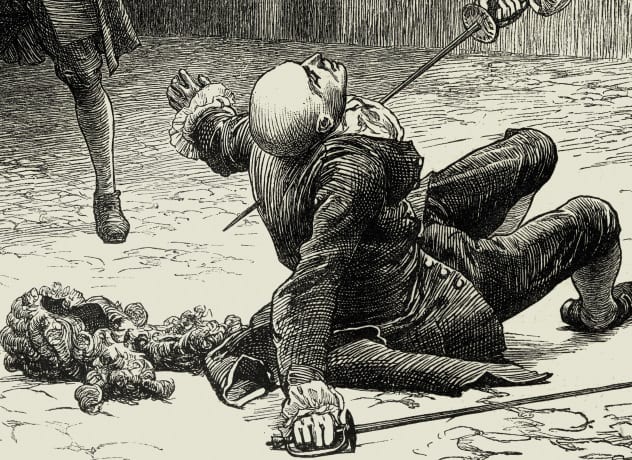
In 1712, after ten years of litigation, Baron Mohun challenged the Duke of Hamilton to a duel. Both men’s wives had been granddaughters of the 1st Earl of Macclesfield. So when the 3rd Earl of Macclesfield died without an heir in 1702, both women laid claim to the inheritance. Mohun himself had been named the heir to the 2nd Earl of Macclesfield.
Mohun was not a newcomer to dueling. He had been tried, and acquitted, of murder twice following previous duels, and he fought to win.
In November 1712, the two men fought a fierce duel by sword, both sustaining serious wounds. Both men died. However, it was said that the Duke had been killed not by Mohun but by Mohun’s second, Lieutenant Genernal MacCartney. MacCartney is said to have thrust his sword through the Duke’s chest, a clear breach of the rules.[9]
MacCartney fled the country and was tried in absentia for murder. He was stripped of his army rank and deemed not to be a gentleman. Poor thing.
1 Monsieur Granpree And Monsieur Le Pique
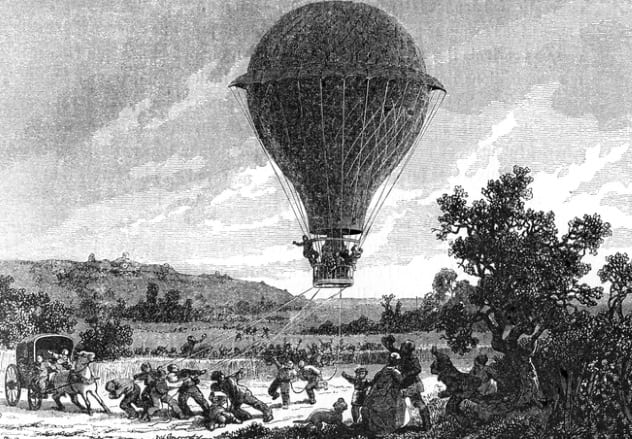
When Monsieur Granpree discovered his ballerina mistress in a compromising position with Monsieur Le Pique, he became, well, piqued and challenged the other to a duel. And, being slightly dotty, the two men decided to duel from balloons.
They both spent a month in training before meeting in a field near Paris in May 1808. They each climbed into their balloons with their seconds and their blunderbusses.
At 9:00 AM, the restraining cords on the baskets were cut, and each balloon ascended gracefully into the air above a crowd of spectators who had gathered to watch. They attempted to maneuver their balloons the appropriate distance apart, and then Le Pique fired the first shot, which went wide.
Granpree returned fire, and as everyone but them could have predicted, the shot ripped through the silk of his opponent’s balloon, causing it to descend rapidly and uncontrollably. Le Pique and his second were “dashed to pieces” against the roof of a nearby house.
Monsieur Granpree, as a victory salute, let his balloon ascend higher. It then drifted uncontrollably before finally coming down a long time later, some 39 kilometers (24 mi) off from where he intended.[10]
Ward Hazell is a writer who travels, and an occasional travel writer.
Read about more unique duels from history on Top 10 Female Duels And Duelists and Top 8 Remarkable Duels.






